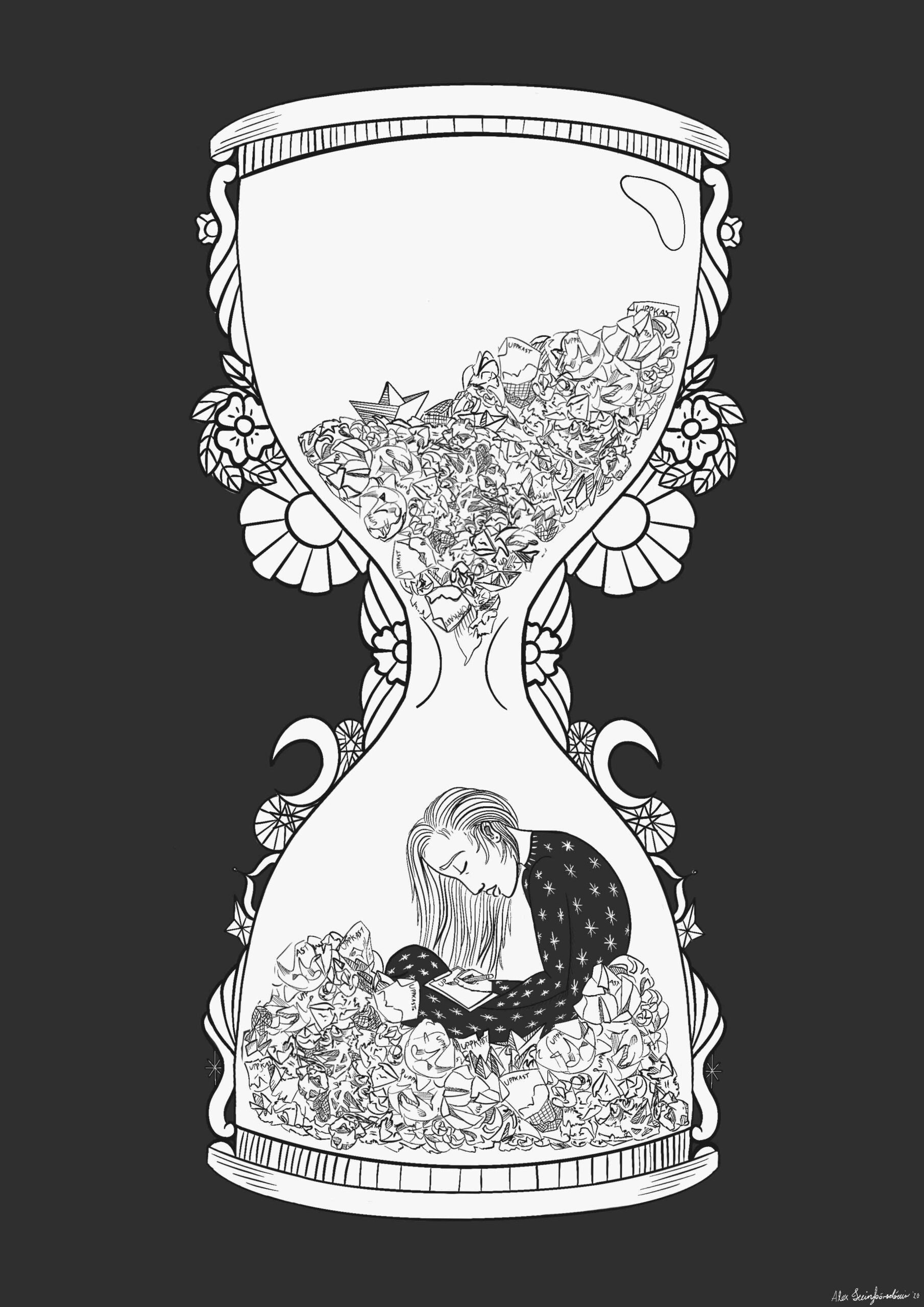

Steinunn Ása Sigurðardóttir
images:
Alexandra Dögg Steinþórsdóttir
uppskera-listamarkadur.is/collections/alex-steinthorsdottir
@alexsteinthorsdottir
www.alexsteinthorsdottir.com
translation:
Being a perfectionist is a term all of us are familiar with. It is, however, a common misunderstanding that being a perfectionist entails having everything under control, being super organized, being neat and tidy. This is, in fact, far from true, at least in my case.
I have been struggling with procrastination for a long time, especially in my studies. I have never completely understood where it originates from and I thought the problem was me not being better organized. I first heard of the connection between perfectionism and procrastination when I was talking to my friend, however, I couldn’t put the two together.
My friend and I have many things in common: we share hobbies and interests, have chosen similar paths in life and we have always done well in school. We are, if I may say so myself, pretty smart. The worst part of it is that in the beginning of our education we didn’t need to put much effort into it – which ironically has its advantages and disadvantages. We did well in primary school and even throughout high school. We could get away with studying for an exam on the day before and still get a good grade, and maybe even a better one than some of our classmates that had put in much greater effort. I realize that it is a great privilege that my schoolwork came so easily to me – but it came back to haunt me later.
Many girls grow up getting used to praises for doing well in school and, moreover, getting praises for good grades. At the end of each semester, after me and my best friend got our report cards, our mothers used to take us to a coffee shop to celebrate our good grades – with the best of intentions, of course, who doesn’t want to celebrate their child doing well in school?
The problem was, however, that it taught me that good results were all that matters. I measured my self-worth with good grades – and I’m far from being alone in doing so.
We are afraid of making mistakes because it may confirm that we are not good enough. It becomes our greatest fear that we are not qualified. As a result, we skip doing things despite wanting to because we are afraid that we are not good enough and we procrastinate till the last minute.
I don’t know how often I have postponed writing my essays. I think that I don’t know enough to start writing, not in the right mood, the right environment, or that I have too much time right now and don’t want a bad grade (which, of course, is a great paradox). It is not only that I postponed working on it – I also spent hours researching and reading articles the first days, without ever getting anything written down. I probably read ten long articles for one short paragraph and ended up only using two of them. When I had spent all this time for only a few words, I did most of the work the last hours before I submitted my papers. Amazingly, I usually ended up getting a good grade for it. I don’t say this to sound cocky, because this process was hell every single time. But there was a comfort in knowing how good the results turned out to be – it must have meant that I’m smart, think if I had begun writing sooner! This way of thinking is, however, driven by the fear of failing, especially the fear of putting great effort into something that doesn’t get a good enough result. It is far from the case that I don’t want to do the assignments in school or read the reading material. I have always enjoyed my studies (although some courses are more interesting than others). It is rather the feeling that if I don’t understand the readings right away or if I don’t already know the focus of the essay before I start then I get the feeling I am not smart enough and I don’t want to face that feeling.
This way of thinking hasn’t done anything good for me. It hasn’t been an easy journey, despite always doing good in school and I pushed myself through it in an unhealthy way.
I would probably have enjoyed my studies more if I had allowed myself to rest instead of always having bad conscience over taking breaks, not constantly working and being the hard-working girl, everyone said I was. This fear of not being good enough unless I got good grades has in retrospect been there since I can remember.


Two years ago, this fear turned into anxiety. I think it has been lurking there underneath for a much longer time. For a long time, I used the anxiety as a whip and believed that I couldn’t get things done well enough without being under pressure. Therefore, I managed to keep it somewhat under control. After major changes in my life and a few setbacks it came bursting through in March 2019 when I got my first anxiety attack. The first one I noticed, at least. In the wake of this I went through a very rough period, but I was incredibly lucky with the support I got throughout it. I also decided early on to seek help dealing with the anxiety.
This journey was a big steppingstone for me. I needed to confront my thoughts about myself and how my self-worth was related to getting good results in school. I also learned that this need for confirmation inhibited me from trying new things. Struggling with anxiety isn’t necessarily related to perfectionism and procrastination. However, in my case it has contributed to my insecurities.
But can something be done to counteract the need to procrastinate? It can most definitely help to be more organized, use apps to control your work hours and help with your concentration. It can also help you limiting the time you use on social media by using apps that block them after a certain amount of time.
But that doesn’t solve the root of the problem, the need for always being perfect.
I, therefore, try to be conscious of these thoughts and try to prevent them from deterring me. To focus on your mindset is good – to put effort into things rather than thinking about the result needing to be perfect. It is not a death sentence learning you could have done something better or not receiving the highest grade for your assignment. We miss out on so much by holding back and not trying. Namely, the opportunity of progress. We need to learn that we do not know everything – and to accept that fact. To start on something rather than waiting and learning to recognize the fear of not knowing everything and do it anyway.
There are higher standards put on women in our society, which leads to them putting higher standards on themselves.
It discourages us from doing things, both because we criticize ourselves and become afraid of how our work gets received. We need to have this mental note when we talk to young girls and praise them for their process, rather than the outcome. Let’s allow ourselves to feel our way and learn that the world doesn’t end if we not get the highest grade each time, it is just an opportunity to grow and develop.
Do you support Vía?
Vía counts on your support. By subscribing to Vía you contribute to the future of a medium that specializes in, and puts emphasis on equality and diversity.
Vía, formerly known as Flóra, was founded 4 years ago for critical readers that want to dive underneath the superficial layer of social discussion and see it from an equality, inclusion, and diversity perspective.
From the beginning, Vía has covered urgent societal topics and published issues and articles that have shone a light on inequality, prejudice, and violence that exist in all layers of society.
We emphasize publishing stories from people with lived experiences of marginalization.
Every contribution, big and small, enables us to continually produce content aimed to educate and shine a light on hidden inequalities in society, and is essential for our continuing work.
Support Vía
You Do Not Look at All Like You Are Autistic


My Right to Exist


Reasons for Young Women to Move to the Countryside (Job Offers are Not One of Them)


Bipolar disorder: Even the calm is stormy, on the sideline


Read more about...